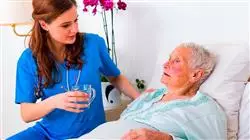University certificate
The world's largest faculty of nursing”
Introduction to the Program
A complete program that will help you to know the most up-to-date protocols and techniques of the moment’’

To ensure proper patient monitoring, it is essential that the student learns to determine the causes and factors related to the onset of symptoms. Detailed learning of the semiology and examination methods will allow to carry out a well-founded medical history with which to build care plans adapted to the patient.
This program has been structured by grouping the symptoms according to the system or apparatus affected, including both mild and more serious manifestations. The aim is for the professional to be able to perform a complete assessment of the patient and their environment, responding to the urgent signs and symptoms, but without neglecting the other elements and factors that make up the patient and condition their health.
It must be taken into account that the therapeutic management of pain is a topic of special relevance. In addition to being one of the most frequent symptoms, pain produces great fear and impact on both the patient and their family. In this sense, the student will understand the basis of oncologic pain, its multidimensional nature and the need for a comprehensive assessment. The study of analgesic modalities will allow them to abandon myths and prejudices that, even today, persist among health professionals.
Upon completion, the specialized nurse will have the necessary knowledge to carry out advanced clinical practice and will be able to develop care plans adapted to the symptoms presented by the patient at each stage of their disease, providing quality care and ensuring their safety.
The up-to-date contents of this program and its integrative approach will result in a comprehensive view on all aspects related to oncology nursing. The contents will provide a journey through the diverse needs of cancer patients, whose particularities require personalized attention.
Both the design of the program and the didactic material used will facilitate the understanding of concepts, and the realization of practical cases will help to adapt what has been learned to clinical practice. In this way, this Professional Master’s Degree will provide immersive learning in order to prepare professionals for real situations in their daily professional practice.
Don’t miss this opportunity to study in the largest private online university”
This Postgraduate certificate in Clinical Manifestations and Emergencies in the Oncologic Patient contains the most complete and up-to-date scientific program on the market. The most important features include:
- The development of case studies presented by experts in Oncology Nursing
- The graphic, schematic, and practical contents with which they are created, provide scientific and practical information on the disciplines that are essential for professional practice
- News on clinical manifestations and emergencies in oncology patients
- Practical exercises where self-assessment can be used to improve learning
- Its special emphasis on innovative methodologies in the emergency treatment of oncology patients
- Theoretical lessons, questions to the expert, debate forums on controversial topics, and individual reflection assignments
- Content that is accessible from any fixed or portable device with an Internet connection
This Postgraduate certificate is the best investment you can make when choosing a refresher program to expand your existing knowledge in Oncology Nursing”
The teaching staff includes professionals from Nursing Oncology, who bring their experience to this educational program, as well as renowned specialists from leading societies and prestigious universities.
The multimedia content, developed with the latest educational technology, will provide the professional with situated and contextual learning, i.e., a simulated environment that will provide immersive education programmed to learn in real situations.
This program is designed around Problem-Based Learning, whereby the specialist must try to solve the different professional practice situations that arise throughout the program. For this purpose, the professional will be assisted by an innovative interactive video system created by renowned and experienced experts in Oncology Nursing with extensive experience.
This program comes with the best educational material, providing you with a contextual approach that will facilitate your learning"

This 100% online Postgraduate certificate will allow you to combine your studies with your professional work while increasing your knowledge in this field"
Why study at TECH?
TECH is the world’s largest online university. With an impressive catalog of more than 14,000 university programs available in 11 languages, it is positioned as a leader in employability, with a 99% job placement rate. In addition, it relies on an enormous faculty of more than 6,000 professors of the highest international renown.

Study at the world's largest online university and guarantee your professional success. The future starts at TECH”
The world’s best online university according to FORBES
The prestigious Forbes magazine, specialized in business and finance, has highlighted TECH as “the world's best online university” This is what they have recently stated in an article in their digital edition in which they echo the success story of this institution, “thanks to the academic offer it provides, the selection of its teaching staff, and an innovative learning method aimed at educating the professionals of the future”
A revolutionary study method, a cutting-edge faculty and a practical focus: the key to TECH's success.
The most complete study plans on the university scene
TECH offers the most complete study plans on the university scene, with syllabuses that cover fundamental concepts and, at the same time, the main scientific advances in their specific scientific areas. In addition, these programs are continuously being updated to guarantee students the academic vanguard and the most in-demand professional skills. In this way, the university's qualifications provide its graduates with a significant advantage to propel their careers to success.
TECH offers the most comprehensive and intensive study plans on the current university scene.
A world-class teaching staff
TECH's teaching staff is made up of more than 6,000 professors with the highest international recognition. Professors, researchers and top executives of multinational companies, including Isaiah Covington, performance coach of the Boston Celtics; Magda Romanska, principal investigator at Harvard MetaLAB; Ignacio Wistumba, chairman of the department of translational molecular pathology at MD Anderson Cancer Center; and D.W. Pine, creative director of TIME magazine, among others.
Internationally renowned experts, specialized in different branches of Health, Technology, Communication and Business, form part of the TECH faculty.
A unique learning method
TECH is the first university to use Relearning in all its programs. It is the best online learning methodology, accredited with international teaching quality certifications, provided by prestigious educational agencies. In addition, this disruptive educational model is complemented with the “Case Method”, thereby setting up a unique online teaching strategy. Innovative teaching resources are also implemented, including detailed videos, infographics and interactive summaries.
TECH combines Relearning and the Case Method in all its university programs to guarantee excellent theoretical and practical learning, studying whenever and wherever you want.
The world's largest online university
TECH is the world’s largest online university. We are the largest educational institution, with the best and widest online educational catalog, one hundred percent online and covering the vast majority of areas of knowledge. We offer a large selection of our own degrees and accredited online undergraduate and postgraduate degrees. In total, more than 14,000 university degrees, in eleven different languages, make us the largest educational largest in the world.
TECH has the world's most extensive catalog of academic and official programs, available in more than 11 languages.
Google Premier Partner
The American technology giant has awarded TECH the Google Google Premier Partner badge. This award, which is only available to 3% of the world's companies, highlights the efficient, flexible and tailored experience that this university provides to students. The recognition as a Google Premier Partner not only accredits the maximum rigor, performance and investment in TECH's digital infrastructures, but also places this university as one of the world's leading technology companies.
Google has positioned TECH in the top 3% of the world's most important technology companies by awarding it its Google Premier Partner badge.
The official online university of the NBA
TECH is the official online university of the NBA. Thanks to our agreement with the biggest league in basketball, we offer our students exclusive university programs, as well as a wide variety of educational resources focused on the business of the league and other areas of the sports industry. Each program is made up of a uniquely designed syllabus and features exceptional guest hosts: professionals with a distinguished sports background who will offer their expertise on the most relevant topics.
TECH has been selected by the NBA, the world's top basketball league, as its official online university.
The top-rated university by its students
Students have positioned TECH as the world's top-rated university on the main review websites, with a highest rating of 4.9 out of 5, obtained from more than 1,000 reviews. These results consolidate TECH as the benchmark university institution at an international level, reflecting the excellence and positive impact of its educational model.” reflecting the excellence and positive impact of its educational model.”
TECH is the world’s top-rated university by its students.
Leaders in employability
TECH has managed to become the leading university in employability. 99% of its students obtain jobs in the academic field they have studied, within one year of completing any of the university's programs. A similar number achieve immediate career enhancement. All this thanks to a study methodology that bases its effectiveness on the acquisition of practical skills, which are absolutely necessary for professional development.
99% of TECH graduates find a job within a year of completing their studies.
Postgraduate Certificate in Clinical Manifestations and Emergencies in the Oncology Patient
The Postgraduate Certificate in Clinical Manifestations and Emergencies in the Oncologic Patient is a program designed to train Nursing professionals in the care of oncologic patients who require urgent attention. Oncology patients may present with a wide variety of symptoms due to the evolution and pathophysiology of their disease and antineoplastic treatments. This scenario makes it frequent the need for care in occasions, of urgent nature, which will test the training of the Nursing professional who will attend them in the first line.This Postgraduate Certificate aims to provide Nursing professionals with the most updated knowledge in this field. Students will learn about the most common clinical manifestations in oncology patients, as well as the emergencies that may occur in the context of the disease. They will also be trained to identify and manage the side effects of treatments, such as fatigue, weight loss and depression.
Studying Nursing in Oncology
The program is designed to provide students with a thorough and practical understanding of clinical manifestations and emergencies in the oncology patient. Students will learn about caring for cancer patients at different stages of the disease and in different health care settings. They will also be trained to work in teams with other health professionals, including physicians, psychologists and social workers.The course is led by experts in the field, who will provide the highest quality teaching in the urgent care of the oncology patient. At the end of the course, you will be in a position to apply your knowledge in the working world and contribute to improving the quality of life of oncology patients in emergency situations.In conclusion, if you want to specialize in the emergency care of oncology patients, the Postgraduate Certificate in Clinical Manifestations and Emergencies in the Oncology Patient is the perfect option for you. Take advantage of this unique opportunity to acquire specialized knowledge and improve your skills in health care, enroll now and become a highly skilled professional in the urgent care of oncology patients!







